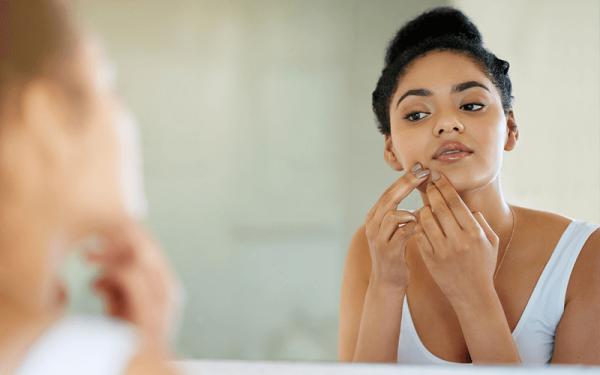Though there are many different types of acne and levels of severity, all forms of acne have one thing in common: fluctuating hormones.
Acne occurs when pores or hair follicles become clogged with oil — or sebum — and dead skin cells. Bacteria get trapped inside the pore and grow, triggering an immune system response that causes redness and swelling.
During puberty, acne is a response to natural changes in hormones that stimulate the oil glands of the face and body, increasing sebum production. But hormonal acne isn’t limited to teenagers. It can occur at any age and is especially common in women ages 20 to 50. In fact, statistics show that some 50% of women between the ages of 20 and 29, and 25% of women between 40 and 49 experience acne.
“Acne often worsens with hormonal fluctuations during the menstrual cycle or menopause, as well as in some adults with conditions such as polycystic ovarian syndrome,” says Dr. Lauren Snitzer, a board-certified dermatologist with U.S. Dermatology Partners Sugar Land.
Some women taking hormone replacement therapies to ease menopause symptoms may also experience acne, as some treatments replace lost estrogen and progesterone with progestin, which can cause breakouts.
Hormonal acne is different in adults because unlike other types of acne, it doesn’t typically show up in the T-zone — the area of the face from the midpoint of the forehead to the nose and chin. Instead, it is most likely to appear on the cheeks, chin, and jawline and can include blackheads, whiteheads, small “pimples” or even cysts.
So, what can you do to control hormonal acne? Our dermatologists share their top tips…
#1: Ask your doctor about oral contraceptives.
The FDA has approved oral contraceptives like Yaz, Estrostep and Ortho Tri-Cyclen for the treatment of acne in women. These contraceptives combine the female hormone estrogen with the synthetic version of the male hormone progesterone. They can stabilize fluctuating hormones and ultimately help to control acne. Though these medications can be very effective, they can take up to three to six months to show results. If you are experiencing acne and not already taking an oral contraceptive, consider discussing this option with your dermatologist.
#2: Consider spironolactone.
Oral contraceptives are not right for everyone. If you are a smoker or have a history of high blood pressure, blood clots or breast cancer, or if contraceptives have not been effective in controlling your acne, your dermatologist may prescribe a drug called spironolactone (Aldactone). This medication — primarily used to treat high blood pressure — can also regulate the hormonal surges that can stimulate oil production and lead to acne.
#3: Talk to your doctor about retinoids.
Mild acne may also respond to over-the-counter topical benzoyl peroxide products and retinoids. These creams, gels, and lotions can help remove oil and dirt from pores, kill bacteria, reduce inflammation and ultimately prevent future breakouts. For moderate to severe acne, your doctor may recommend a prescription-strength retinoid along with an antibiotic like tetracycline, minocycline, erythromycin or doxycycline to help clear the bacteria that cause acne to worsen.
“Antibiotics are often combined with retinoids to increase the effectiveness of the treatment,” says Dr. Snitzer. “These treatments are very good at clearing acne, but it can take several weeks to see results.”
#4: Cut out the dairy and sugar.
High-sugar foods like juice, candy, and sweets can cause insulin levels to spike, triggering the body to produce hormones that can cause acne. Dairy that is rich in hormones can also cause acne to worsen. Consuming more fruits and vegetables and fewer sweets, dairy products, and processed foods can help reduce inflammation and keep your hormones in balance, which is good for your body and your skin. It’s also important to drink plenty of water — roughly 13 cups a day for men and nine for women.
#5: Get plenty of sleep and relax.
Managing your stress is key to managing your acne. It’s important to get plenty of sleep and to take time to relax! Stress doesn’t cause acne directly, but it causes your skin to produce more sebum, which can lead to more breakouts.
“Acne is more than just a cosmetic problem; it’s a serious dermatological condition that can cause a lot of stress and embarrassment. If you have persistent acne that isn’t responding to over-the-counter treatments, it may be time to call a dermatologist,” says Dr. Snitzer. “There are many different treatment options available for women experiencing hormonal acne that can help to clear up acne and restore self-confidence.”
For women who have experienced scarring from severe acne in the past, there are a number of non-invasive treatments that can significantly improve the look and feel of your skin. These include chemical peels, laser skin resurfacing and microdermabrasion.
Looking to Visit a Dermatologist for Acne Treatments?
To learn more about hormonal acne and other acne that isn’t responding to over-the-counter treatments, contact U.S. Dermatology Partners today to find a treatment plan that is right for you. We have multiple locations throughout the country, so fill out our simple online form to get in touch with us. One of our local team members will reach out to you shortly to answer your questions or schedule an appointment for you to visit us soon.
Find a location near me
or

